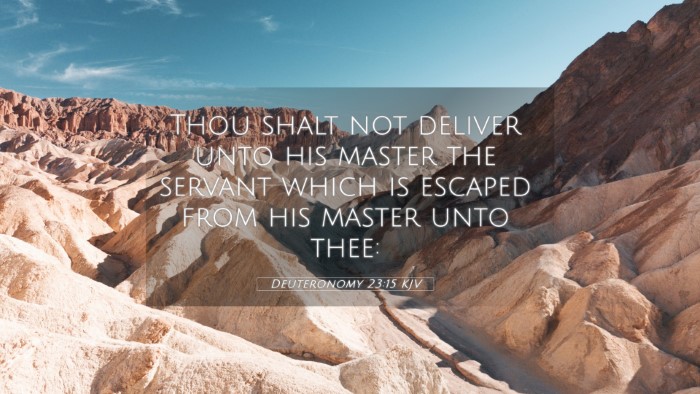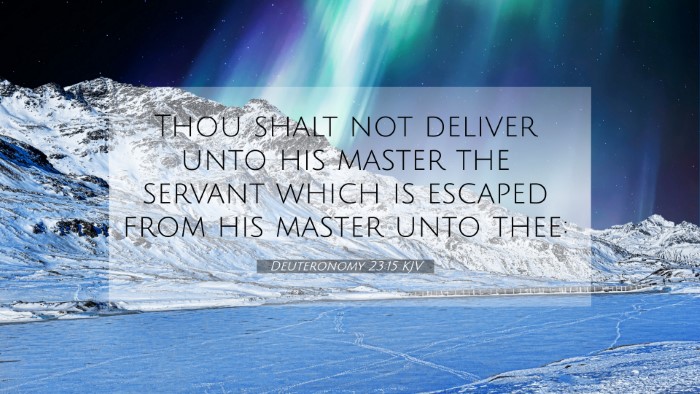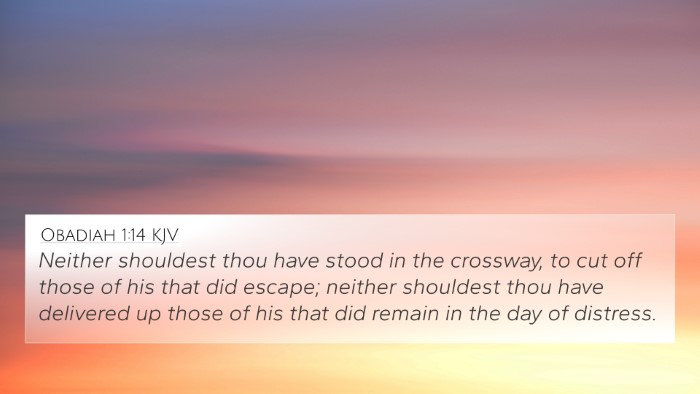Meaning and Interpretation of Deuteronomy 23:15
Deuteronomy 23:15 states: "Thou shalt not deliver unto his master the servant which is escaped from his master unto thee." This verse addresses the treatment of runaway slaves, emphasizing compassion and justice within the community of Israel.
Contextual Overview
The Book of Deuteronomy serves as a reminder of the laws given to the Israelites, guiding them in ethical living and community harmony. This specific verse emphasizes mercy towards those who seek refuge, highlighting the moral obligation of God's people to protect the vulnerable.
Commentary Insights
Matthew Henry's Commentary
Matthew Henry elucidates that this law lays down the principle of humane treatment for those in dire circumstances. It considers the plight of the runaway slave not only in terms of legal standing but also in light of compassion. Henry emphasizes the importance of not returning a runaway back into oppression, showcasing the broader Biblical theme of mercy and justice.
Albert Barnes' Notes on the Bible
Albert Barnes further interprets this verse by emphasizing God's concern for social justice and the dignity of every individual. Barnes notes that runaway slaves should not be returned to their masters but rather treated with dignity within their new community. This reflects God's overarching commitment to protecting the oppressed and marginalized.
Adam Clarke's Commentary
Adam Clarke highlights that this verse is part of the larger legal and moral framework in which Israel was to operate. Clarke observes that the law functions to prevent oppression and promote a humane society where those in need can find solace and safety.
Thematic Connections in the Bible
This verse not only addresses a specific situation but also connects with larger Biblical themes of liberation, care for the oppressed, and social justice. Here are some notable connections:
- Exodus 21:16: Explains the serious offense of kidnapping, underlining the sanctity of personal freedom.
- Leviticus 19:10: Advocates for caring for the poor and the sojourner, enhancing the theme of compassion.
- Isaiah 58:6: Speaks about true fasting as involving freedom for the oppressed, echoing the spirit of Deuteronomy 23:15.
- Matthew 25:35: Jesus emphasizes the importance of caring for the needy, connecting New Testament ethics with Old Testament law.
- Luke 4:18: Jesus cites His mission to bring freedom to the oppressed, aligning with the ethos of providing refuge.
- Galatians 5:1: Paul speaks of the freedom Christ grants, resonating with the themes of liberation found in Deuteronomy.
- Romans 13:10: Underlines that love is the fulfillment of the law, similar to the compassion urged in this verse.
Cross-Referencing Biblical Texts
This verse opens the door for cross-referencing Biblical texts that explore freedom, mercy, and justice. Engaging with these connections provides a richer understanding of God's heart concerning human dignity.
Tools for Bible Cross-Referencing
Utilizing various Bible cross-reference tools such as concordances and study guides can illuminate how Deuteronomy 23:15 interrelates with other scriptures. Cross-reference Bible studies allows readers to identify these selected themes, encouraging a deeper engagement with Biblical texts.
Inter-Biblical Dialogue
The verse fosters a dialogue between the Old and New Testament, demonstrating a continuity in the ethical teachings of scripture. This illustrates that God's principles concerning justice and mercy transcend time.
Conclusion
Deuteronomy 23:15 embodies essential themes of mercy, justice, and the call to protect the vulnerable. By examining various commentaries and employing cross-references, one can appreciate the profound implications of this verse within the broader tapestry of Scripture. Engaging with these texts not only aids in individual understanding but also fosters communal discussions on ethical living as guided by biblical principles.




